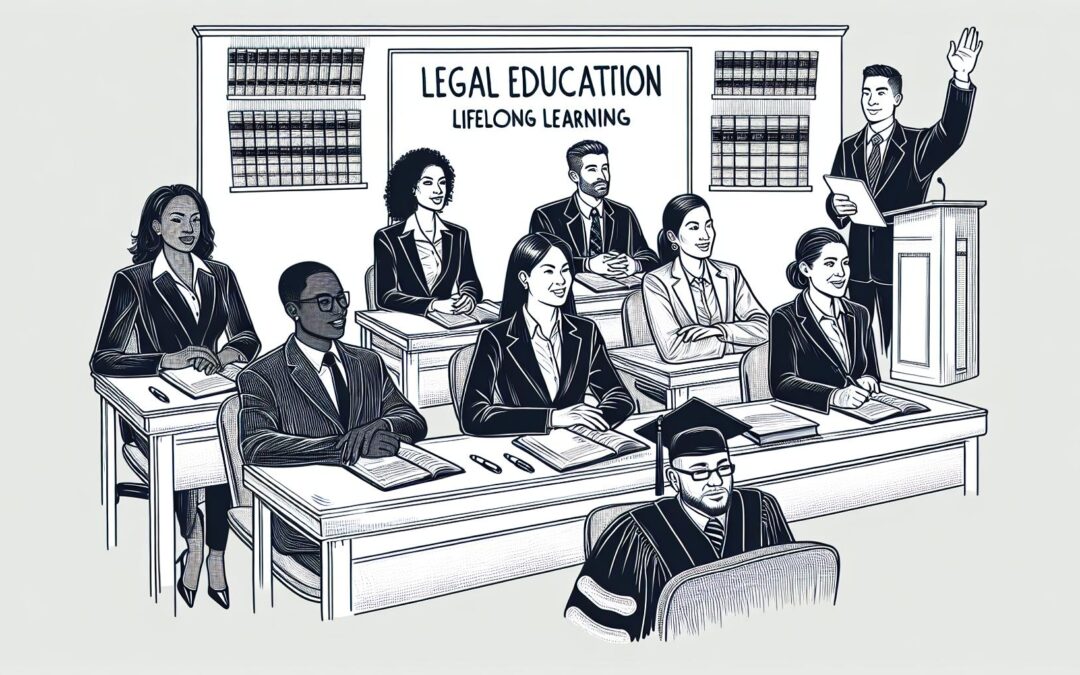In the complex world of intellectual property, cancellation proceedings play a significant role in protecting and challenging various forms of intellectual property rights. Understanding the fundamentals of cancellation proceedings is crucial for any individual or business involved in the realm of intellectual property.
Understanding Intellectual Property: A Brief Overview
In order to grasp the essence of cancellation proceedings, it is first necessary to have a clear understanding of what intellectual property entails and its importance in today’s society.
Definition and Importance of Intellectual Property
Intellectual property refers to the legal rights granted to individuals or entities for their creative and innovative works. These rights are designed to protect intangible assets and provide exclusivity to the creators or owners of these works.
Intellectual property encompasses a wide range of creations, including inventions, literary and artistic works, symbols, names, and images used in commerce. These creations can be protected by various legal mechanisms, such as patents, trademarks, copyrights, and trade secrets.
The importance of intellectual property cannot be overstated. It encourages innovation and creativity by providing incentives for individuals and businesses to invest in research and development. By granting exclusive rights to creators, intellectual property laws foster an environment where ideas can flourish and be rewarded.
Furthermore, intellectual property rights play a crucial role in economic growth and progress. They enable creators to reap the rewards of their efforts, which in turn encourages further innovation and investment. Intellectual property rights also facilitate trade and investment by providing a framework for the protection and enforcement of these rights.
Types of Intellectual Property: Patents, Trademarks, Copyrights, and Trade Secrets
There are several types of intellectual property, each with its own set of rules and regulations. Understanding these distinctions is crucial for anyone considering cancellation proceedings.
1. Patents: Patents protect inventions and technological advancements. They grant the inventor exclusive rights to make, use, and sell their invention for a limited period of time. Patents encourage innovation by providing inventors with a monopoly over their invention, giving them a chance to recoup their investment and profit from their creation.
2. Trademarks: Trademarks safeguard brand names, logos, and other distinctive signs that distinguish goods or services in the marketplace. They serve as valuable assets for businesses, helping consumers identify and differentiate between products or services. Trademark protection ensures that businesses can build and maintain a positive reputation, while also preventing others from capitalizing on their brand’s goodwill.
3. Copyrights: Copyrights protect original creative works such as books, music, films, and artwork. They give creators the exclusive right to reproduce, distribute, display, and perform their work. Copyright protection encourages artistic expression by allowing creators to control the use and commercial exploitation of their creations, ensuring they receive appropriate recognition and compensation.
4. Trade Secrets: Trade secrets safeguard confidential business information that provides a competitive advantage. This can include formulas, processes, customer lists, and other valuable proprietary information. Unlike patents or trademarks, trade secrets are protected through secrecy and confidentiality measures. Trade secret protection allows businesses to maintain their competitive edge and prevent unauthorized use or disclosure of valuable information.
Each type of intellectual property offers unique benefits and requires specific procedures for registration and protection. Understanding these distinctions is essential for individuals and businesses to effectively navigate cancellation proceedings and protect their intellectual property rights.
Diving into Cancellation Proceedings
With a foundational knowledge of intellectual property established, let us explore the intricacies of cancellation proceedings and their crucial role in safeguarding intellectual property rights.
What is a Cancellation Proceeding?
A cancellation proceeding is a legal mechanism that allows interested parties to challenge the validity of an intellectual property right. It is typically initiated by a party who believes that a registered patent, trademark, copyright, or trade secret should not have been granted or is no longer valid.
When a cancellation proceeding is initiated, it sets in motion a complex legal process that involves thorough examination and scrutiny of the disputed intellectual property right. The party challenging the validity of the right must provide compelling evidence and arguments to support their case.
Throughout the cancellation proceeding, both parties have the opportunity to present their arguments, submit evidence, and engage in legal discourse. This ensures a fair and transparent evaluation of the disputed intellectual property right, allowing for a well-informed decision to be made.
It is important to note that cancellation proceedings can be time-consuming and costly. The parties involved must be prepared to invest significant resources into building their case, obtaining legal representation, and navigating the intricacies of the legal system.
By commencing a cancellation proceeding, individuals or businesses can attempt to invalidate an existing intellectual property right, thereby opening up opportunities for their own creations or challenging the exclusivity of competitors.
The Role of Cancellation Proceedings in Intellectual Property
Cancellation proceedings serve a crucial role in maintaining the integrity and fairness of intellectual property rights. They provide a platform for parties to challenge potentially questionable or improperly obtained rights, ensuring that the system operates in a just and equitable manner.
Moreover, cancellation proceedings foster healthy competition and innovation by allowing for the examination and potential modification of existing intellectual property rights. This process encourages a dynamic environment where new ideas can flourish and outdated or invalid rights can be rectified.
Furthermore, cancellation proceedings contribute to the overall development and evolution of intellectual property law. As disputes arise and cancellation proceedings are initiated, courts and legal authorities are presented with new and complex issues that require careful consideration and interpretation of existing laws and regulations. This ongoing process of legal analysis and decision-making helps shape the intellectual property landscape, ensuring that it remains relevant and effective in the face of ever-changing technological advancements and societal needs.
In conclusion, cancellation proceedings play a vital role in the realm of intellectual property. They provide a means for parties to challenge the validity of existing rights, promote healthy competition and innovation, and contribute to the ongoing development of intellectual property law. As the world of intellectual property continues to evolve, cancellation proceedings will remain an essential mechanism for safeguarding and shaping the future of innovation and creativity.
The Process of Cancellation Proceedings
Now that we understand the significance of cancellation proceedings, let us delve into the steps involved in initiating and navigating this intricate process.
Cancellation proceedings are a crucial aspect of intellectual property law, serving as a mechanism to challenge the validity of an existing intellectual property right. Whether it is a trademark, patent, or copyright, cancellation proceedings provide an avenue for individuals or organizations to dispute the legitimacy of these rights.
Before embarking on a cancellation proceeding, it is crucial to carefully assess the merits of the case and gather sufficient evidence to support the challenge. This process requires a comprehensive understanding of intellectual property laws and regulations, as well as the ability to analyze the strength of the opposing party’s rights. Consulting with legal professionals experienced in intellectual property law is highly recommended to ensure a thorough and effective process.
Once the decision to proceed is made, a formal complaint must be filed with the appropriate intellectual property office or court. This complaint outlines the reasons for the challenge and presents the evidence supporting the claim. It is essential to draft a well-structured and persuasive complaint, as it sets the foundation for the entire cancellation proceeding.
The Stages of a Cancellation Proceeding
Cancellation proceedings typically involve several stages, each with its own specific requirements and timelines. Understanding these stages is essential to navigate the process successfully.
Firstly, after the complaint has been filed, the opposing party has an opportunity to respond and defend their intellectual property right. This stage may involve the exchange of legal arguments, evidence, and supporting documentation. Both parties must meticulously analyze the strength of their positions and formulate persuasive legal arguments to support their claims.
Next, a hearing or trial may take place, allowing both parties to present their cases and provide additional evidence or witness testimony. This stage is crucial for the parties to articulate their positions and address any questions or concerns raised during the process. The hearing provides an opportunity for the cancellation board or court to evaluate the credibility of the evidence presented and assess the legal arguments put forth by each party.
Ultimately, a decision is reached by the appropriate authority, either confirming the validity of the intellectual property right or canceling it in whole or in part. The decision-making process involves a careful examination of the evidence, legal arguments, and applicable laws and regulations. The cancellation board or court must weigh the competing interests and make a fair and informed decision.
The losing party may have the option to appeal the decision to a higher court or authority. This avenue allows for a review of the cancellation proceeding and the opportunity to present additional evidence or legal arguments. The appellate court or authority will assess the lower court’s decision and determine whether any errors were made or if there are grounds for overturning the ruling.
In conclusion, cancellation proceedings are complex and intricate processes that require careful consideration, thorough preparation, and a deep understanding of intellectual property law. Successfully navigating these proceedings can result in the cancellation of an invalid intellectual property right, providing opportunities for individuals and organizations to protect their own rights and interests.
The Impact of Cancellation Proceedings on Intellectual Property Rights
As cancellation proceedings can have far-reaching consequences for intellectual property rights, it is vital to consider their potential impact and implications.
How Cancellation Proceedings Can Affect Your Intellectual Property
A successful cancellation proceeding can result in the removal or limitation of an existing intellectual property right, potentially affecting the exclusivity and market advantages associated with it. This may create new opportunities for competitors or alternative creators.
On the other hand, if an intellectual property right successfully withstands a cancellation proceeding, it reinforces its validity and strengthens the position of its owner. This outcome provides certainty and security for the owner and serves as a deterrent to potential challengers.
Protecting Your Intellectual Property: Avoiding Cancellation Proceedings
The best defense against cancellation proceedings is to ensure that your intellectual property rights are valid, properly registered, and maintained throughout their lifespan. Conducting thorough research, seeking professional legal advice, and maintaining compliance with relevant laws and regulations can greatly reduce the risk of facing a cancellation proceeding.
Moreover, regularly monitoring the marketplace for potential infringements or challenges to your intellectual property rights can help identify and address any issues proactively, minimizing the likelihood of cancellation proceedings.
Case Studies: Cancellation Proceedings in Action
Examining real-world examples of cancellation proceedings can provide insightful lessons and shed light on the complexities and outcomes of these legal battles.
Notable Intellectual Property Cancellation Proceedings
Throughout history, several high-profile cancellation proceedings have captivated the intellectual property arena. These cases exemplify the impact and significance of cancellation proceedings on various industries and the legal landscape as a whole.
One such example is the landmark trademark cancellation proceeding involving a well-known food and beverage company, which challenged the validity of a competitor’s trademark based on similarities and potential confusion among consumers.
Lessons Learned from Past Cancellation Proceedings
Past cancellation proceedings highlight the importance of conducting robust research, building a strong case with substantial evidence, and staying vigilant in safeguarding intellectual property rights. They emphasize the need for ongoing monitoring and proactive measures to protect and defend one’s intellectual property.
Furthermore, these cases demonstrate the need for constant adaptation and evolution in response to changing market dynamics and legal frameworks surrounding intellectual property rights.
Conclusion
Cancellation proceedings are a powerful tool in the realm of intellectual property, allowing parties to challenge and defend the validity of these valuable rights. Understanding the intricacies and processes involved in cancellation proceedings is essential for anyone seeking to protect and safeguard their intellectual property or navigate the challenging landscape of intellectual property law.
By comprehending the significance of cancellation proceedings, one can better appreciate the delicate balance between innovation, exclusivity, and fair competition. As the world continues to evolve, the importance of cancellation proceedings in intellectual property terminology will only continue to grow.











